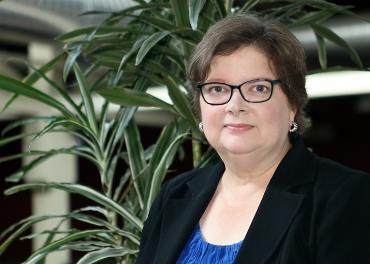This story originally appeared in Lawyer, Fall 2022.
 First, Mary Griffin ’17 took on the school district as a mom. Then she took it on as a lawyer.
First, Mary Griffin ’17 took on the school district as a mom. Then she took it on as a lawyer.
Griffin secured a significant win for more than 300 special education students when she filed two community complaints against Seattle Public Schools last year for the district’s failure to meet their educational and physical needs during the COVID-19 pandemic.
After 10 years of advocating for her autistic son, the fight came naturally for her. It’s why she went to law school at the age of 53, an abrupt change from her first career as a nurse practitioner specializing in geriatric care.
“I decided that the best way to keep advocating for our son was to become a lawyer,” she said. “There were so many opportunities for improvements in the treatment of students with disabilities.”
When the pandemic hit in the spring of 2020, Griffin was just three years out of law school, a newly minted lawyer. But she was well-connected in the education community, having served as president of the Seattle Special Education PTSA and as a member of several other advocacy groups.
As it became clear that the 2020-21 school year would remain online only, Griffin grew increasingly concerned about students whose special needs – both physical and mental — required in-person education.
“It was devastating for these families, especially those who relied on school nurses,” she said. “They felt like they had to choose between keeping their child alive and things like sleep, or their jobs, or their other children.”
Gathering stories and documentation from multiple families, Griffin convinced the Office of the Superintendent of Public Instruction (OSPI) that Seattle Public Schools had violated the Individuals with Disabilities Education Act with its significant delay of promised in-person services, including nursing care. OSPI ordered extra tutoring for students and improved its review of nursing plans to ensure 1:1 care.
Andrea Kadlec ‘17, an attorney with Disability Rights Washington, said the pandemic provided an important catalyst for education advocates, who met regularly to talk about how to help special needs students. “Mary was instrumental in getting more funding for civil legal aid from the state for education, and we’re now creating a statewide alliance to continue that work even beyond the pandemic,” she said.
In addition to being law school classmates, Kadlec and Griffin were longtime friends from the advocacy movement; Kadlec’s daughter has Down’s syndrome. “We spent a lot of time plotting and prodding, as we liked to call it, trying to figure out how to change the system,” Kadlec said.
Griffin hopes the OSPI decision is just one victory of many more to come. This work became her life’s mission when she and her husband took in, and later adopted, a 9-year-old foster son. He was emaciated, barely 45 pounds, and had behavioral problems relating to past neglect and abuse. Griffin discovered that at school, he was restrained in a prone position on the floor while a teacher laid on top of him.
“It was inhumane. I don't know why anyone would think that was appropriate for a small child, but it was entirely legal,” she said. “Over time, I got involved in advocacy groups because it was apparent that so many other families had the same problems I did, but even more so.”
Since graduation, Griffin has focused exclusively on education issues for students with disabilities and recently joined Northwest Justice Project as a special education staff attorney. Her advocacy bucket list includes better integration of special education students into general classrooms, elimination of use of isolation, and shifting the burden of proof from families to the school district when there is a question of whether students’ needs are met.
